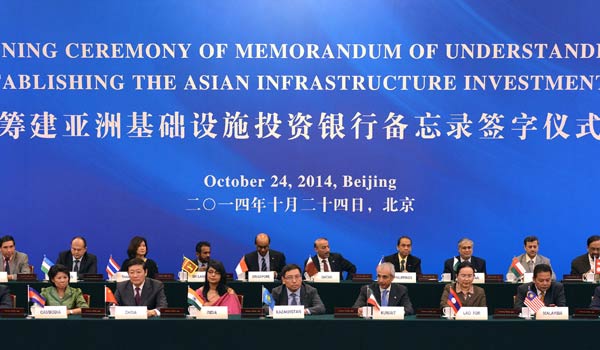

 |
| The signing ceremony of memorandum of understanding on establishing the Asian Infrastructure Investment Bank (AIIB) is held in Beijing, Oct 24 2014. [Photo/Xinhua] |
According to a report in the Financial Times on March 30, Japanese Ambassador to China Masato Kitera said that Japan may sign an agreement with China to become a member country of the AIIB before June. However, Japanese Foreign Minister Fumio Kishida denied this right away and said that the Ambassador had made no such remarks. He also said that he is not troubled by the deadline on March 31. In fact, it is only the deadline for being a founding member and Japan still can apply to be a member country after that date.
Kyodo News Agency reported on March 31 that Japanese Prime Minister Shinzo Abe had expressed the view in Tokyo that it is unnecessary for Japan to rush to join the AIIB since Japan still has doubts about the organizational governance and financing review system of the bank. At the same time, he also said that the US should understand that Japan is a reliable country.
It is not hard to see why Japan is so hesitant. The US has so far said only that it will cooperate with the AIIB, and Japan does not dare to join before the US. However, tempted by the obvious economic benefits the ban offers, US allies have lined up one by one to join the bank, and Japan is beginning to feel anxious. Abe's statement that there is no rush for Japan to join the AIIB leaves the matter open-ended, and suggests that Japan will join the bank in the future.
In fact, it is simply a matter of time until Japan joins the AIIB. Japan has nothing to gain from pretending indifference to a "big cake" like the AIIB, and much to lose - especially as its economic downturn shows no sign of abating. Besides, Japan still has a strong competitive edge in technology, experience and capital. The timing will be decided by the following factors:
Firstly, if the US joins the AIIB, Japan will follow it right away. Secondly, on joining the AIIB, Japan will need to negotiate its position closely with the US. Japan cannot countenance the idea that the US might makes moves independently of Japan, so it is not hard to understand that Abe is eager to show Japan's loyalty to the US. Thirdly, the China-Japan relationship is also an important factor. Right now, the biggest obstacle between the two countries is the historical view of the Abe government. This year marks the 70th anniversary of the world anti-fascist war. The international community, and especially the Asian countries, are all keeping a watchful eye on Abe's words. In a sense, the degree of retrospection expressed by Abe will influence the process of Japan joining the AIIB.
China has maintained a consistent altitude of openness and inclusiveness in welcoming all countries to join the AIIB and make their contribution to infrastructure construction in Asia. No matter whether Japan joins now or later, the decision will be respected by China, and Japan will be welcomed to the fold.
 J-11 fighters in air exercise
J-11 fighters in air exercise Beauties dancing on the rings
Beauties dancing on the rings Attendants-to-be join Mr. & Miss Campus Contest
Attendants-to-be join Mr. & Miss Campus Contest Beijing's toughest anti-smoking law takes effect
Beijing's toughest anti-smoking law takes effect Family lives in cave for about 50 years in SW China
Family lives in cave for about 50 years in SW China PLA soldiers operating vehicle-mounted guns in drill
PLA soldiers operating vehicle-mounted guns in drill Blind carpenter in E China's Jiangxi
Blind carpenter in E China's Jiangxi China hosts overseas disaster relief exercise for the first time
China hosts overseas disaster relief exercise for the first time 20 pairs of twins who will become flight attendants in Sichuan
20 pairs of twins who will become flight attendants in Sichuan Obama is sowing discontent in S.China Sea
Obama is sowing discontent in S.China Sea Rescuers work through night to reach cruise ship survivors
Rescuers work through night to reach cruise ship survivors Driving through limbo
Driving through limbo Facing down MERS
Facing down MERSDay|Week